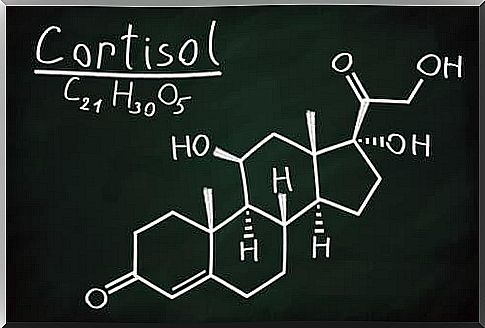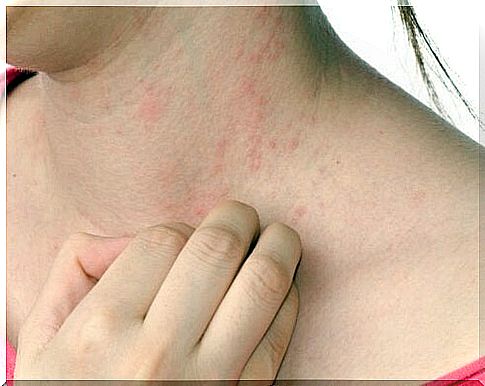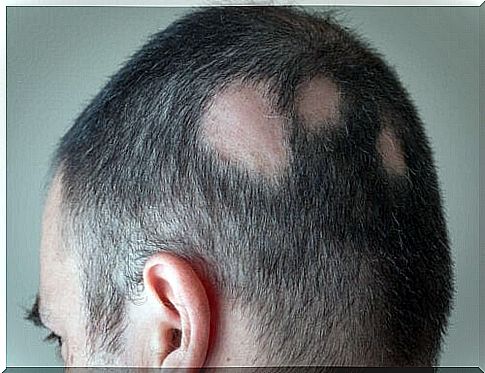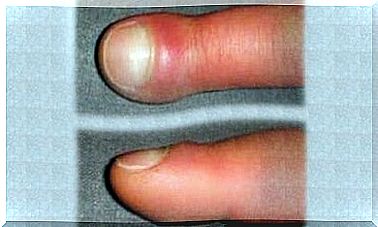Skin Problems Due To Stress
The skin is our largest organ and shows us with a simple look if something is wrong with our body. For example, skin problems can occur due to stress. In this article we will introduce you to the most common ones.
The skin is our largest organ and shows us with a simple look if something is wrong with our body. For example, skin problems can occur due to stress. In this article we will introduce you to the most common ones.
Unlike other organs, skin abnormalities are easily recognizable. In this way, changes can be determined without further aids.
There is an embryological connection between the skin and the nervous system that is still present in adulthood. An increase in stress hormones accordingly results in a number of physiological changes that affect the skin.
The mechanisms of stress are released in what is known as the hypothalamic-pituitary axis, which secretes substances that serve to activate the production of cortisol in the adrenal glands.
The role of stress in skin problems

The primary purpose of stress is to defend our organism in order to ensure our survival. However, if it becomes chronic, it leads to numerous effects that have a negative impact on the body: Skin problems due to stress are the result. These include, for example:
- Loss of elasticity
- wrinkles
- Slackness
- Dullness
- stains
- other relevant diseases
Skin problems caused by chronic stress are related to blood circulation. In stressful situations, the organism has to react quickly in order to initiate strategies for fighting, escaping and paralysis. At the command of the cortisol, the blood flow is redirected to the muscles, heart, lungs and brain. This incision in blood flow affects the skin.
Stress also has a negative effect on the immune system and makes our skin more susceptible to infections and tumors, as the processes of our immune monitoring are interrupted or slowed down.
Cortisol and skin problems from stress
In stressful situations, the skin appears pale, dull and not very vital. Generally, the lack of blood flow is the cause of the resulting skin problems.
Cortisol releases energy in the form of sugars that produce excess metabolites called free radicals. The latter are responsible for the formation of wrinkles and pimples. They also thin the skin and give it a dull appearance.

Another problem that comes with stress is premature aging of the skin. This can be explained by various effects of cortisol that can be added to those already mentioned above:
- Cortisol reduces collagen production, which affects the elasticity of the skin and promotes the formation of wrinkles.
- It decreases melatonin synthesis. Melatonin is a hormone that regulates sleep and prevents skin cells from regenerating at night.
In relation to the emotional effects of stress on the skin, expression lines are the most important. It is often said that the skin is the mirror of the soul. Therefore, emotional distress often manifests itself in the form of wrinkles on the forehead and a frown that reflect our state of mind.
Diseases associated with skin problems due to stress
There are a number of dermatological diseases that are directly related to stress. We present the most important ones below.
acne
Even if hormonal factors play a decisive role in the development of acne, the emotional ones should not be underestimated. It was found that the majority of people struggling with stress had their acne improved through therapy, yoga, meditation, and other relaxation techniques in addition to medication.
Eczema
Atopic dermatitis can be explained by environmental factors, dehydration, skin irritation, infections and even sweat. However, around 70 percent of cases are due to stress.
This skin disorder often manifests itself in a vicious cycle of itching and scratching that can become compulsive and exacerbated by superinfection and other more serious complications.

Skin problems from stress: seborrheic dermatitis
This is a disease that is directly related to stress episodes. It arises in moments of great anxiety, for example due to a change of work or place of residence, a separation, an illness, the death of a loved one or even during exams.
Abrasions
In this case, the patient compulsively scratches himself or herself, which can lead to periods of itching that last for years. Young people are particularly affected, especially girls in adolescence, who are exposed to stress due to hormonal changes. Repeated scratching can cause serious injury.
This problem is usually easier to manage when the problem is mental health, although it may take several years to diagnose it. Often there is also a lack of effective treatment methods.
Alopecia areata
Alopecia areata is a form of hair loss in certain areas of the head in the form of small, coin-sized circles. A genetic predisposition due to autoimmune factors is often responsible for this. However, it has been found that emotional factors can also be a cause.
The direct link between stress and autoimmune diseases has been established. Therefore, it is also worth noting that the incidence of alopecia areata in people with mental illness is between 30 and 90 percent according to studies.
While there are many other skin problems caused by stress, the previous ones are among the most common. However, a particularly typical skin disease is so-called psoriasis, also known as psoriasis.

Skin problems from stress: psoriasis
Psoriasis is characterized by the accelerated life cycle of skin cells that die off early. These accumulate on the surface of the skin in the form of scales and red spots: the result is intense itching and pain.
Psoriasis is an episodic chronic disease. This means that it goes away for a while, but can reappear in stress-related situations.
The severity of psoriasis is directly related to that of stress, anxiety, or depression. According to some studies, the intensity of the illness is proportional to the severity of an existing depression.
All personality traits that make a person prone to stress are also responsible for the development of psoriasis. This makes the direct connection clear.
If the stress is reduced, the anxiety states, including depression and therefore also psoriasis, usually improve.
It should be noted that the latter often leads to social rejection. The sufferer feels stigmatized and withdraws, causing additional stress.
In this article you got to know a few examples of how skin problems can manifest themselves through stress. You have probably also noticed the importance of dealing with stress properly. Because this can not only lead to depression, but also weaken our immune system and indirectly contribute to the development of tumors.









